Mission
The Legal Defense Clinics (LDC) Project aims to strengthen and support the growing movement to decriminalize homelessness by reimagining the relationship of legal work to organizing.
The LDCs are a national network of movement-driven legal clinics dedicated to dismantling the carceral complex of laws and policies that target unhoused communities. This network aims not only to increase front-line legal representation but to fully integrate that legal support into organizing spaces working to build the power of poor and unhoused communities to fight for their own liberation and forge better futures.
Through this form and process, the LDCs facilitate a new depth of relationship between lawyers and organizers in the field, one which harnesses the full range of tools at its disposal, collaborates across time and space, flexes as the movement requires, and sharpens the focus of legal work to address long-term needs of poor and unhoused communities.
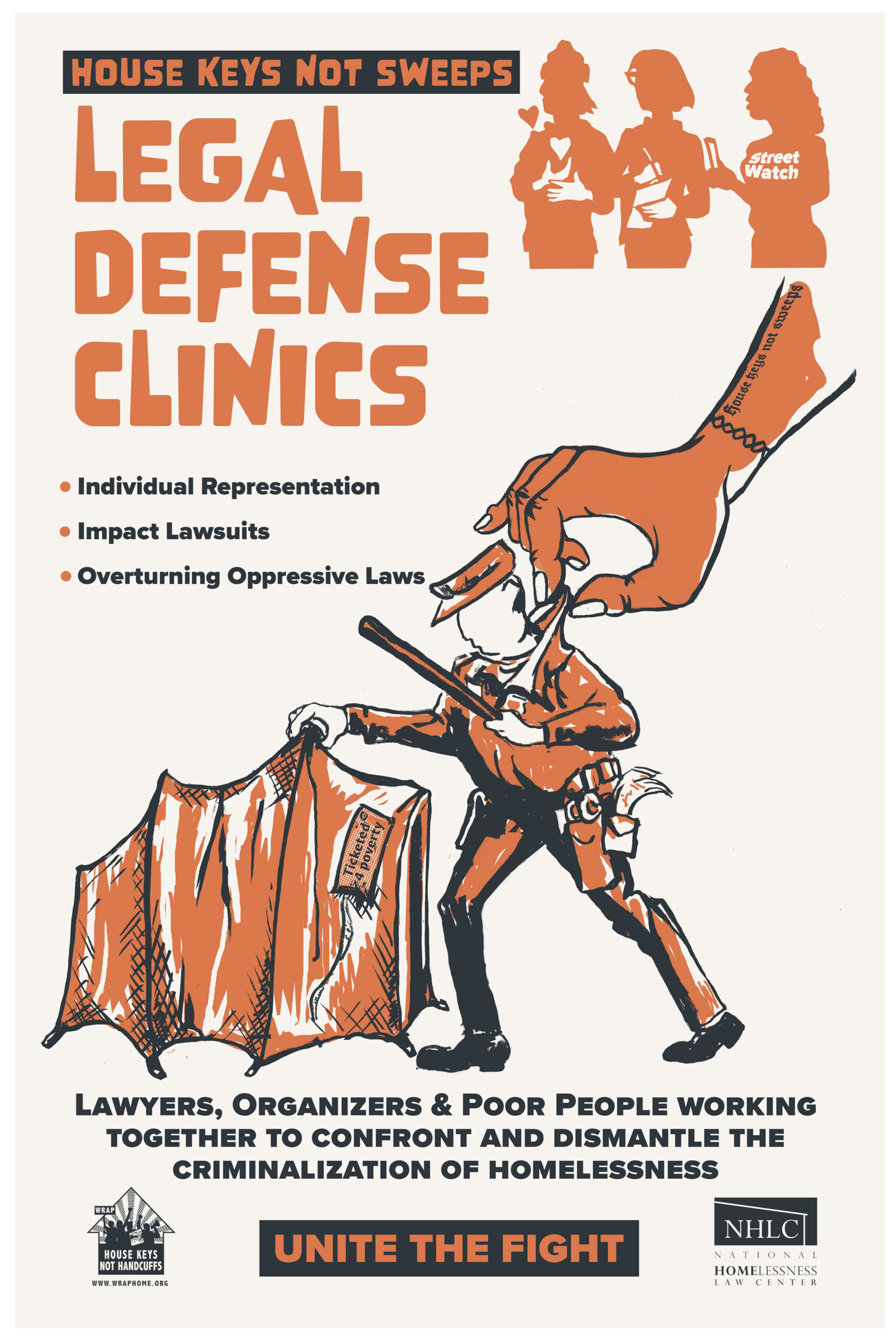
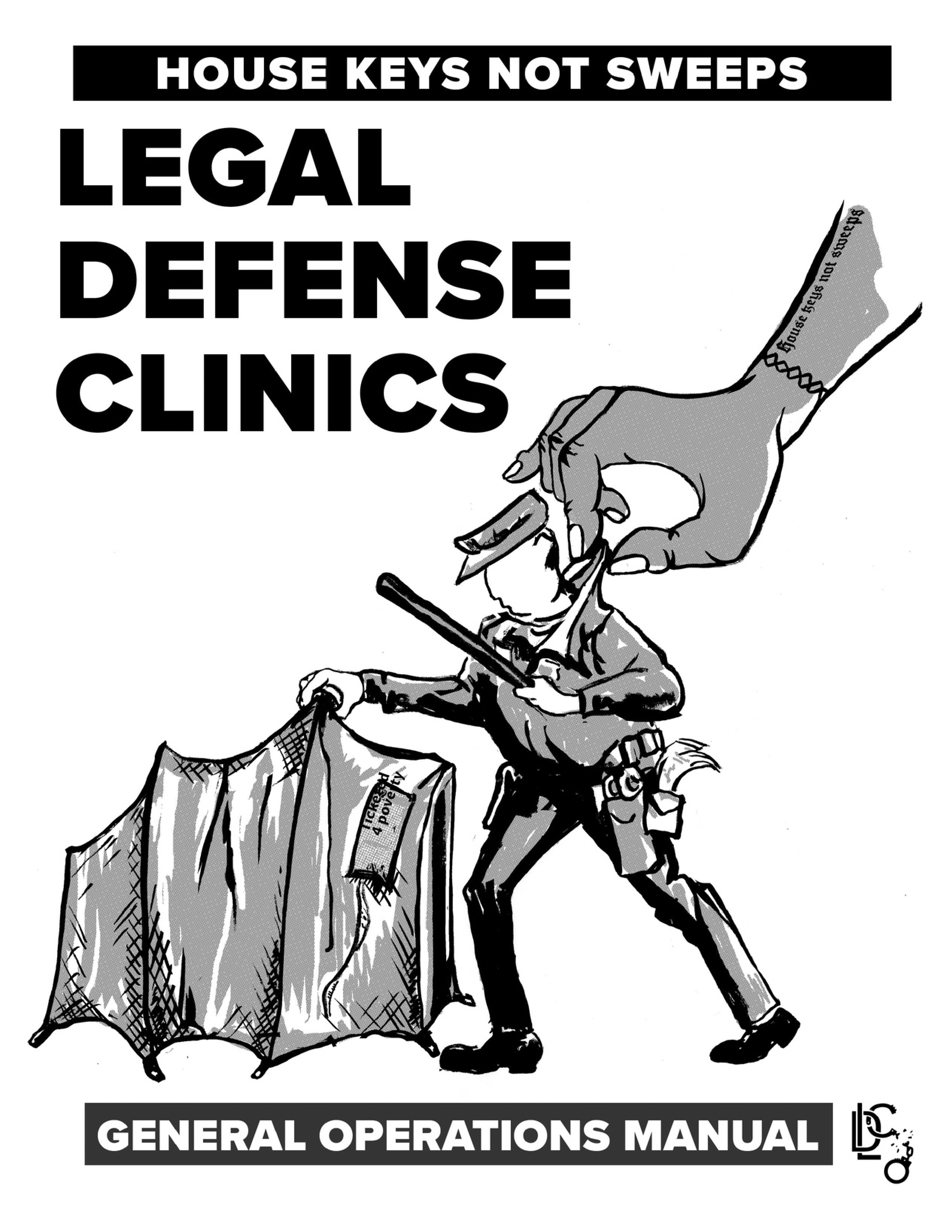
Structure
The LDC Project has the power to respond to specific and direct local needs while operating strategically and flexibly on a national scale. This requires a cohesive crew of like minds and diverse talents working together through many different roles.
National Oversight & Resources
The LDC network is a joint project of the Western Regional Advocacy Project (WRAP) and the National Homelessness Law Center (the Law Center). The two organizations partnered with the intent to implement the LDC project and are responsible for coordinating it at the national level, as the “LDC Core Staff.” In terms of their individual roles:
- WRAP develops and maintains organizing materials for the LDC network (e.g., training manuals, outreach templates, artwork, etc.) and assists local sites with base-building. Oversight and final decision-making power over the national LDC visions rests in WRAP’s core member groups, who also provide strategic guidance and set the broader priorities of the project.
- The Law Center develops and maintains legal materials for the LDC network (e.g. training manuals, model briefs, template forms, etc.), assists local sites with recruiting and training attorneys and pro bono support, provides data sharing and analysis infrastructure, and facilitates the development of litigation strategy.
National Implementation, Administrative & Comms Support
The LDC Core Staff, which is made up of organizing and legal staff from WRAP and the Law Center, oversees and executes the implementation of the LDC Project nationally. This work includes framing the project’s mission and structure, creating core LDC materials (like this document), developing and sharing legal and organizing resources, and coordinating with local sites to launch and run their local clinics (e.g., by assisting with initial outreach, creating strategic work plans, etc.).
Core Staff are also responsible for maintenance work essential to operating the LDC network long-term (e.g., updating manuals, providing administrative support, training local partners, facilitating cross-site communication and strategy, etc.).
Local Implementation, Oversight & Resources
Local organizers implement the LDCs on the ground in partnership with local legal workers, forming the local site staff. This partnership can take several forms and may shift over time as circumstances change, but each will orient legal support around organizing goals and community needs.
While working closely with the LDC Core Staff and Network, local sites “own” their clinic in the sense that they conduct ongoing outreach to affirm local priorities, coordinate legal staffing, manage communication with clients and local partners, and integrate the work of the clinic with their existing campaigns. Local sites also contribute toward resourcing the project as feasible, whether through incorporating it into their budget cycle or seeking additional grant opportunities.
Bringing it all together – The LDC Network
The LDC Network is the web that functions to turn a string of local clinics into a national force for decriminalization. To this end, the network connects all the above key players, locally and nationally, as well as vital allies–legal workers, organizers, academics, volunteers–invested in the project’s goals.
Functionally, the LDC Network is a working group that meets regularly and provides a space for local groups to troubleshoot, access peer support, and coordinate national strategy and messaging. The network also functions as an essential capacity safety net, where expertise is pooled and local sites can request critical resource support in difficult times.
Guiding Principles
- The criminalization of homelessness is a project of racial capitalism, ableism, and settler colonialism.
We cannot meaningfully engage with the goal of decriminalizing homelessness without an analysis that centers anti-racism, disability justice, and decolonization. - Mass homelessness and poverty will never be ended unless the systems of oppression that have created and maintained it are dismantled.
Criminalization as a solution to poverty and homelessness serves only to keep people poor and homeless. - This deep systemic change can only be achieved through grassroots organizing that empowers unhoused people to compel systemic change.
Changing laws or defending individuals against laws may be harm reductive, but is not, and by design cannot be, revolutionary. Legal support must be strategically utilized to leverage power back to grassroots movements and the communities they exist in. - Still, unhoused peoples’ movements have an urgent need for lawyers to do essential harm-reductive work.
The mechanics of criminalization are brutal and efficient, and unhoused communities are relentlessly persecuted by them with little to no legal support. Access to counsel is critical to breaking cycles of criminalization, protecting the legal rights of unhoused people and organizers, and reducing material barriers to their ability to organize and build power. - This legal support must be intentional and based on a praxis of movement lawyering.
Legal work is not inherently transformative; it can uphold and recreate the institutions and systems that drive mass homelessness and poverty. Unhoused peoples’ movements require lawyers willing to disrupt traditional lawyer/client power imbalances, work in true partnership with organizers, ground tactics in movement strategy, and take direction from criminalized communities. - In turn, lawyers need more pathways for developing both their substantive
skills and their own practice of movement lawyering.
There are limited opportunities for new attorneys, or attorneys new to the issues, to enter the field of decriminalization of poverty and homelessness; even fewer that allow this work to be done through a movement lawyering approach. Resources need to be built and maintained to recruit, train, and support more attorneys to come into this crucial work through a movement lawyering framework. - Organizers need networks of collective support to sustain legal support work long term.
Front-line organizers are almost always working at or over capacity. Legal support has been difficult to start up or sustain in the context of this constant capacity scarcity. To create sustainable legal support in these spaces, it is essential to build out a network that can provide local organizers with resources, other material support, and opportunities for mentorship and strategic collaboration.
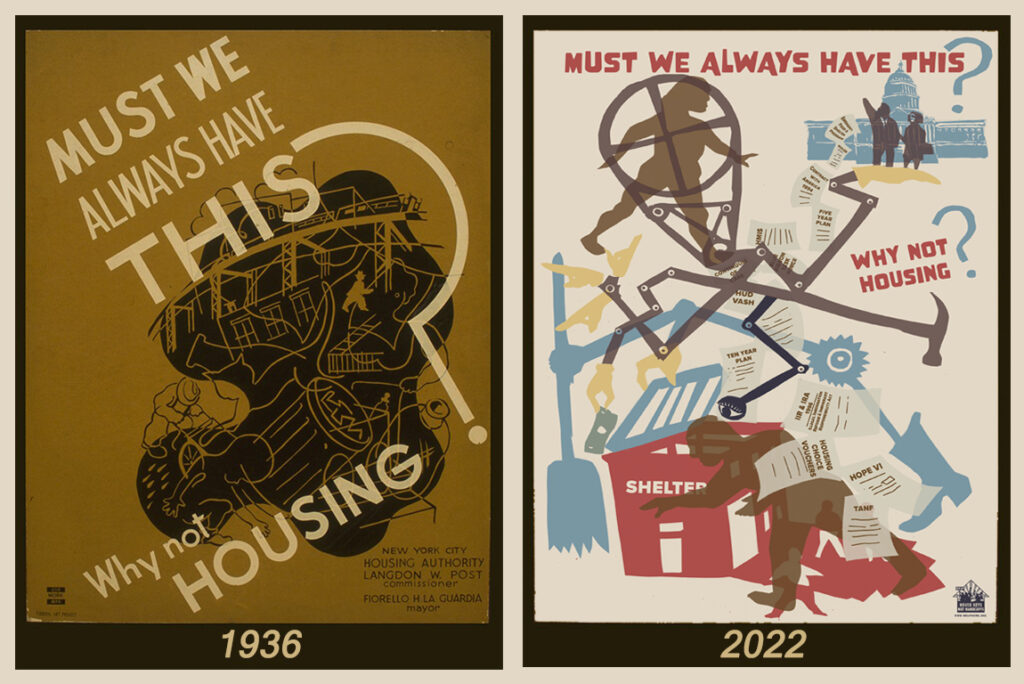
Core Commitments
While the LDCs will expand access to free legal services for poor and unhoused people, its vision does not stop there; the true power of the model is rooted in its capacity to support broader systemic change. In the LDC model, the process through which legal work is done is as radical and as essential as its outcomes. Legal support is integrated directly into existing organizing spaces, and legal tactics are strategically chosen to further movement goals. The relationship nurtured between organizers and lawyers through this process is fundamental to the LDC’s theory of change, and allows for mutual skill-building, nuanced and creative strategizing, and direct accountability to unhoused communities.
To achieve this, all local LDCs commit to five things:
- Developing and centering an intersectional analysis of how neoliberal capitalism, anti-Black racism, settler colonialism, and ableism shape the landscape of criminalization
This includes a commitment to directly addressing these issues internally (e.g., by reviewing hiring practices and being intentional about coalition-building). - Advocating to address the root causes of mass homelessness and poverty, such as the divestment from affordable housing and investment in criminalization
It is also essential that in the effort to dismantle the system of criminalization, we unequivocally reject carceral “solutions” based on myths of broken individuals or service resistance. - Utilizing local legal clinics as a tool of broader grassroots movement work
All legal work done through the LDCs, even if purely harm reductive, is guided by principles of movement lawyering. Because pathways for developing these skills remain limited, the LDCs also commit to nurturing the practice of movement lawyering more broadly through, for example, training, resources, mentorship, and coalition-building. - Growing pathways for unhoused community members to substantively shape and lead their local LDC and the larger organizing work it is embedded in
The LDC Project’s seven priority issue areas were drawn from extensive street outreach conducted by WRAP members. In order to ensure that our work stays accountable to the people directly impacted by anti-homeless laws and policies, the LDC commits to doing two related things: (i) utilizing ongoing outreach in local unhoused communities to shape the structure and strategy of each LDC; and (ii) creating active pathways for unhoused community members to get involved with, and take leadership roles in, organizing work–including in running the LDC itself. - Investing time and resources into building out the LDC network as a vehicle for both increasing organizational capacity at local levels and building power nationally
The LDC network aims to be a hub of skill and resource sharing, communication, and strategic analysis that combines the wisdom and power of local groups, the LDC Core Staff, and allies from our communities. This network also serves the long-term sustainability of the project, acting as a support system that can be leaned on during times of organizational crisis, drain, or upheaval. Keeping the network functioning, relevant, and resourced is vital to fighting criminalization on a national scale.
Goals
The LDCs strive to:
- Increase free direct legal representation to unhoused people by recruiting, training, and supporting local organizers and attorneys to provide much-needed representation in unhoused communities. This legal support will focus on the following seven criminalization issue areas, [1] identified by WRAP members:
- anti-homeless tickets, citations, and arrests
- parking citations and vehicle tows
- stay-away and trespass orders
- harassment by private security
- property confiscation and destruction
- restrictions on food distribution & consumption
- warrants for all of the above
- Bolster existing organizing to decriminalize homelessness by utilizing a movement lawyering model that structures legal work to be in service to goals identified by organizers, who are themselves taking cues from unhoused community members directly via ongoing direct street outreach.
- Build collective power across cities and states by building and expanding the LDC network. This network integrates cross-site collaboration into the process of providing direct legal support, channels the skills and experience of organizers and attorneys across cities and states towards shared strategic goals, and ensures that each local LDC can grow quickly off a stable base and lean on that base in hard times.
- Develop creative and aggressive strategies for supporting movement goals through network collaboration and information sharing. LDC strategy–a multi-pronged approach combining litigation, legislation, policy, and direct legal services–benefits from the pooled expertise of movement workers across geography and generations, and is further bolstered by the collection and analysis of data trends (e.g., on enforcement tactics or demographic information) done by each local LDC.
- Incubate aspiring movement lawyers and expand pathways into movement work.
The LDC network creates pathways at multiple levels for individuals to not only join the movement to decriminalize homelessness, but also to be part of a radical shift in the institution of lawyering. This includes a focus on growing the substantive legal expertise of organizers, attorneys, and unhoused community members; it also includes the opportunity for legal workers to practice these substantive skills through a movement lawyering lens that is not widely available.
[1] This is a non-exhaustive list that may change as laws and enforcement trends change.
Learn More About the LDC Project
We are in the very early phases of the project, developing the resources and infrastructure needed to start implementation. We will soon be seeking initial pilot sites to take on the first launch of the project. We will then look to expand the LDC network more broadly, based on lessons learned in the pilot phase. To become a new LDC site, local communities must have a pre-established organizing base that is directly accountable to unhoused community members.
Where that base does not yet exist, local organizers or attorneys may attend LDC training and webinars and request LDC materials to support their base building or support work.
For updates on this project and related work, subscribe to the WRAP newsletter and the Law Center newsletter.
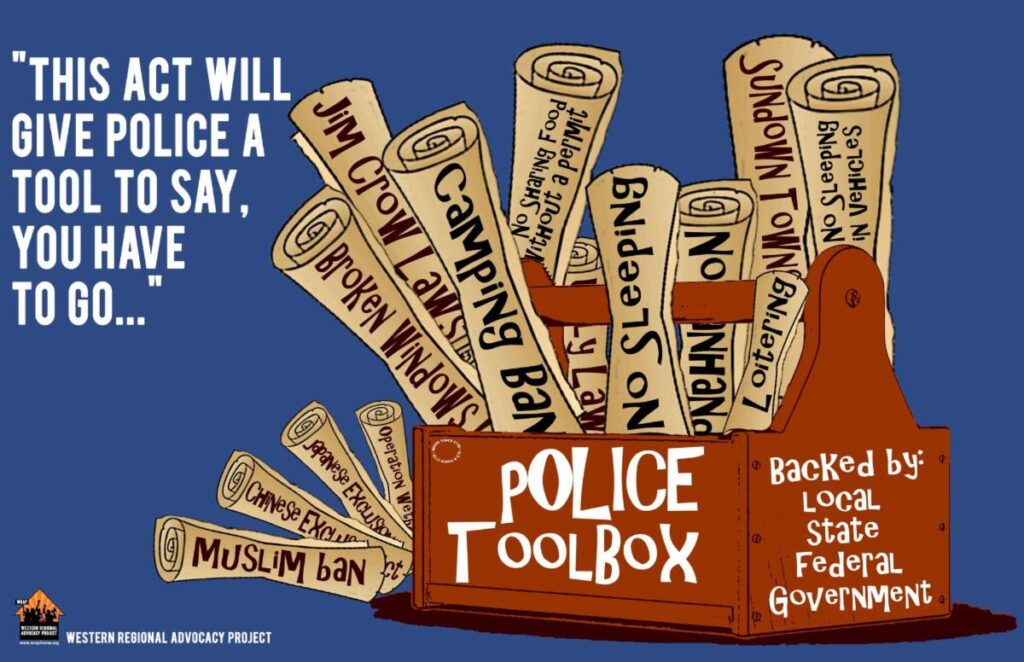
Contact Us!
- If you have questions about the LDC project, are interested in our organizing toolkits, or are interested in providing pro bono support, reach out to us at ldc@wraphome.org.
- For organizing groups interested in anti-criminalization work more broadly, please reach out to wrap@wraphome.org for information about the WRAP Sweeps Campaign.
- For attorneys interested in anti-criminalization work more broadly, please reach out to ldc@homelesslaw.org.
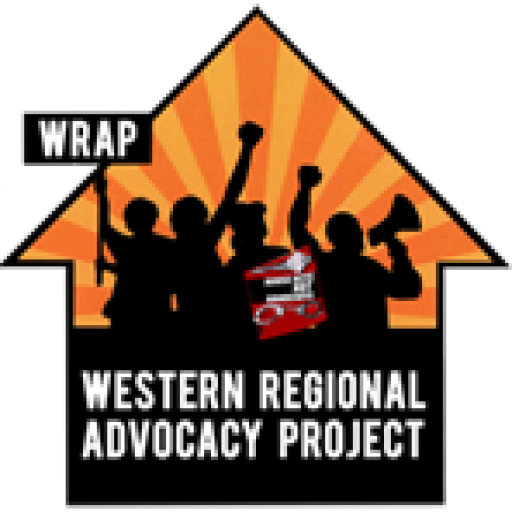
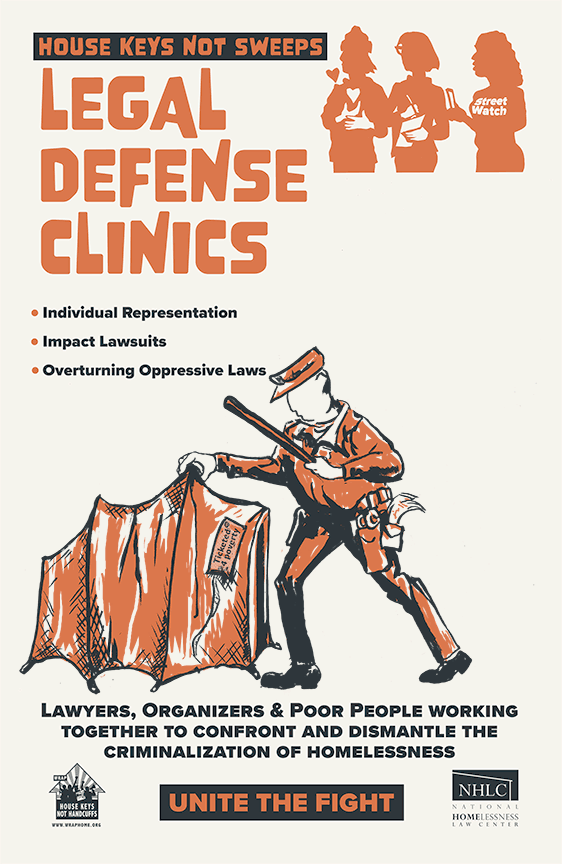
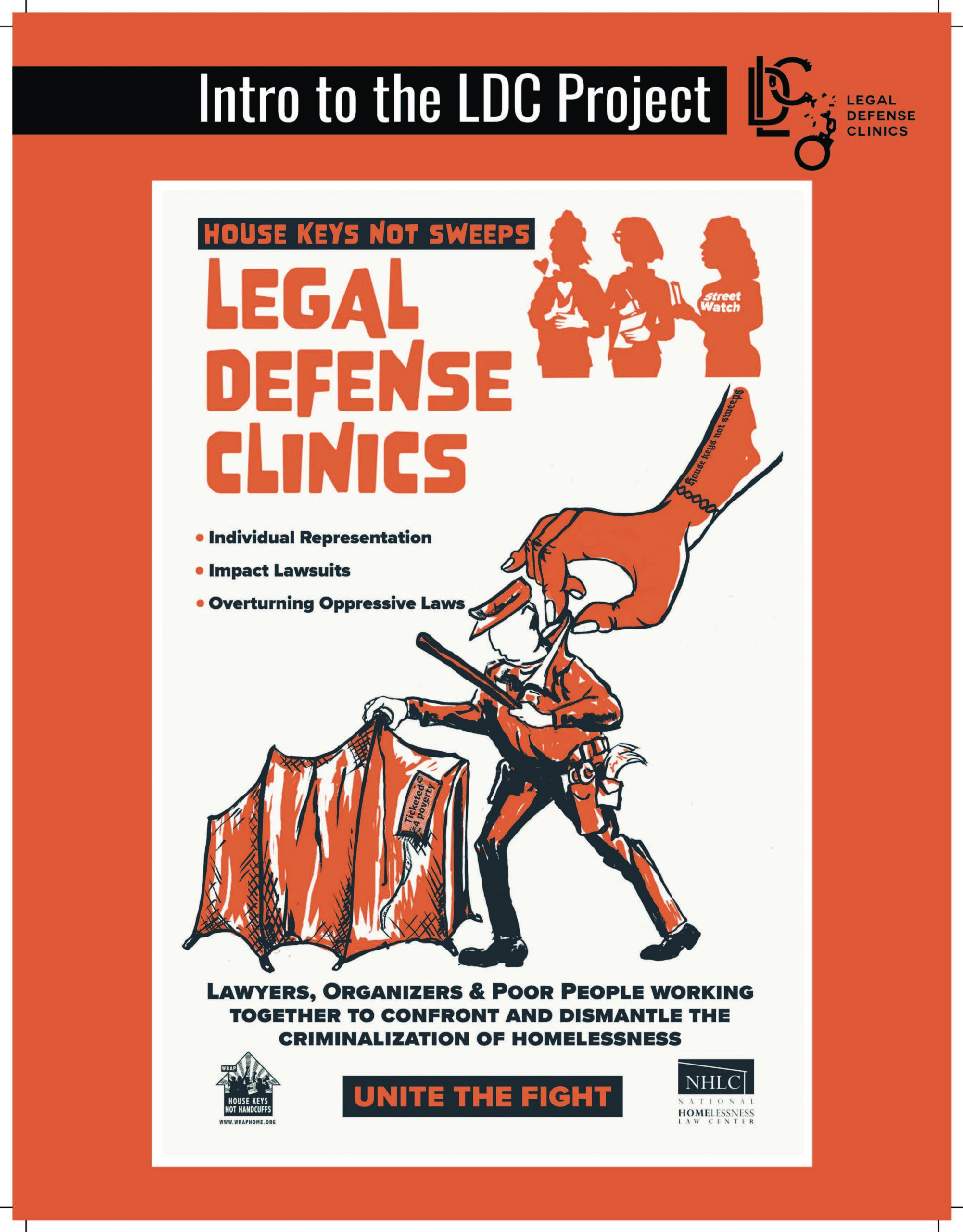
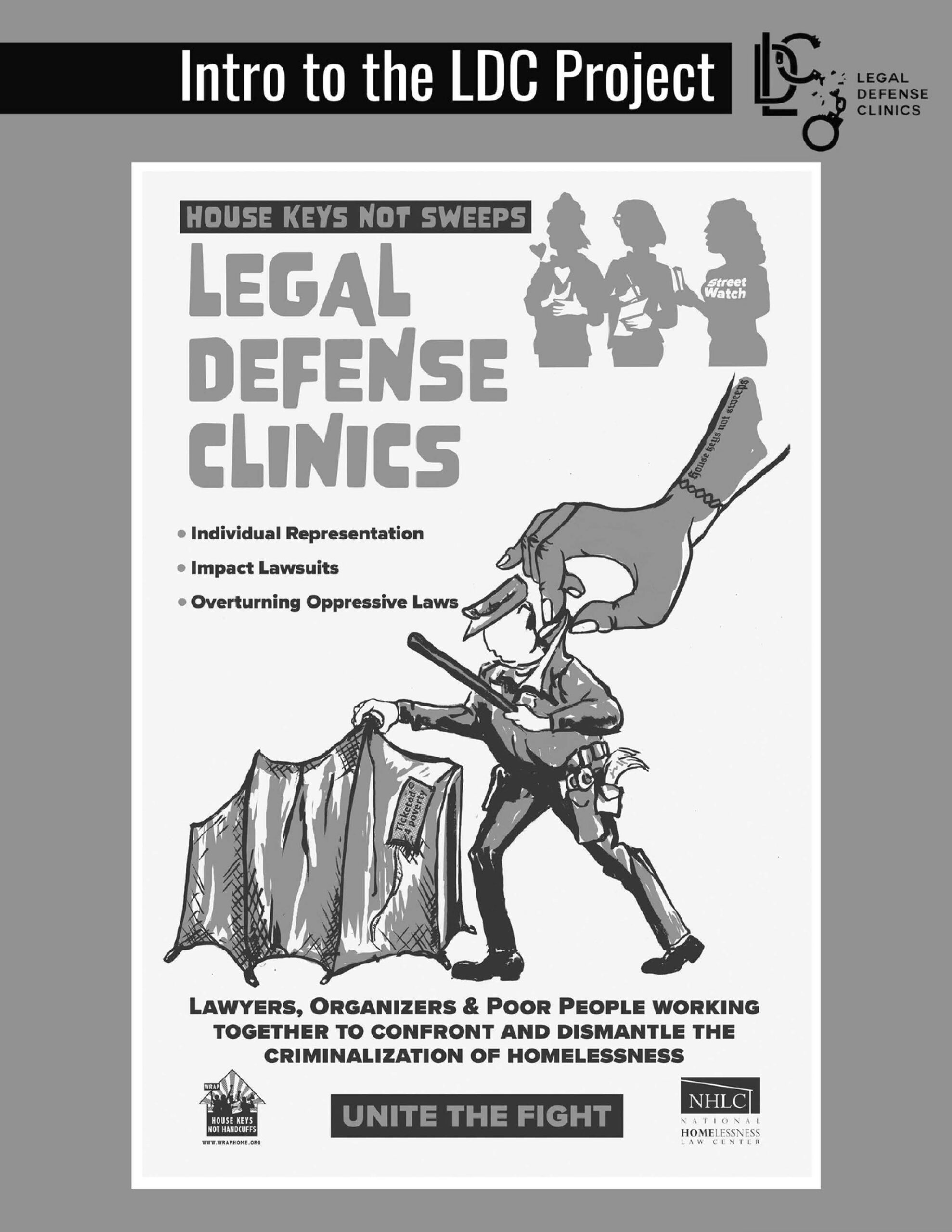
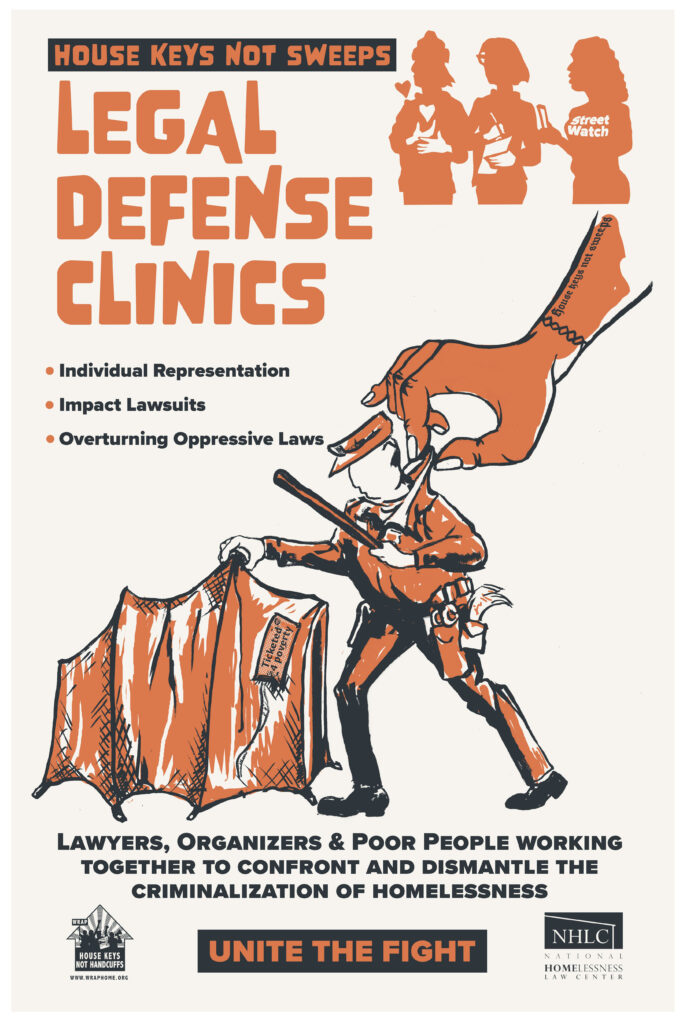
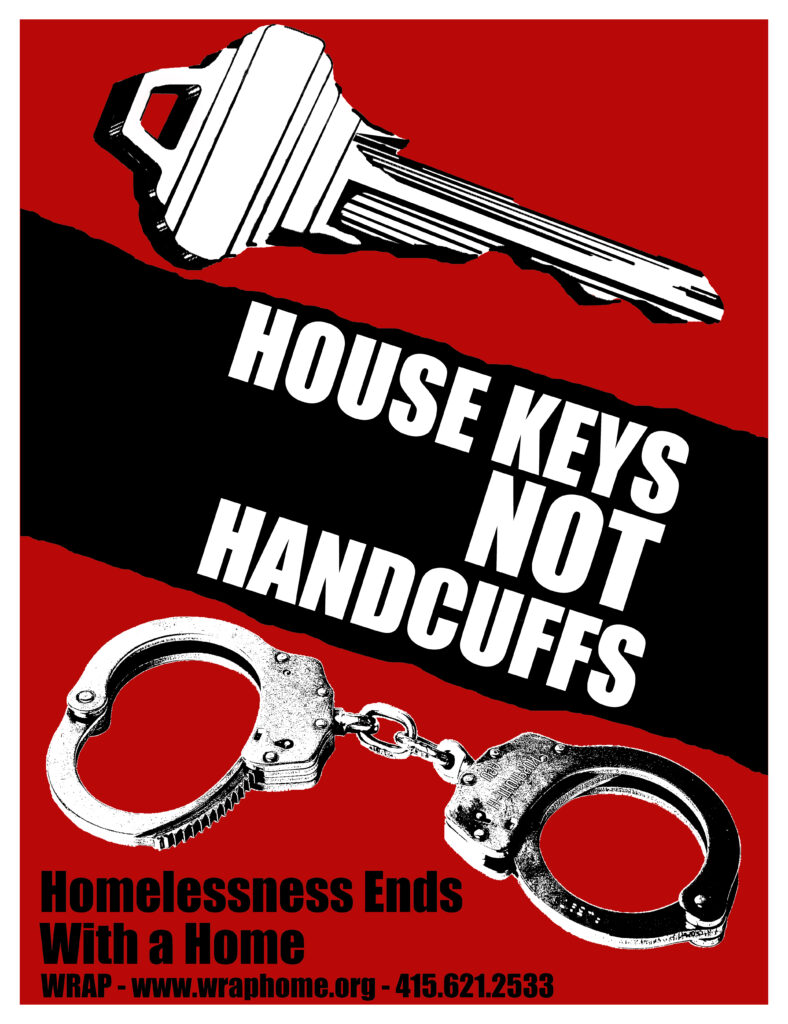
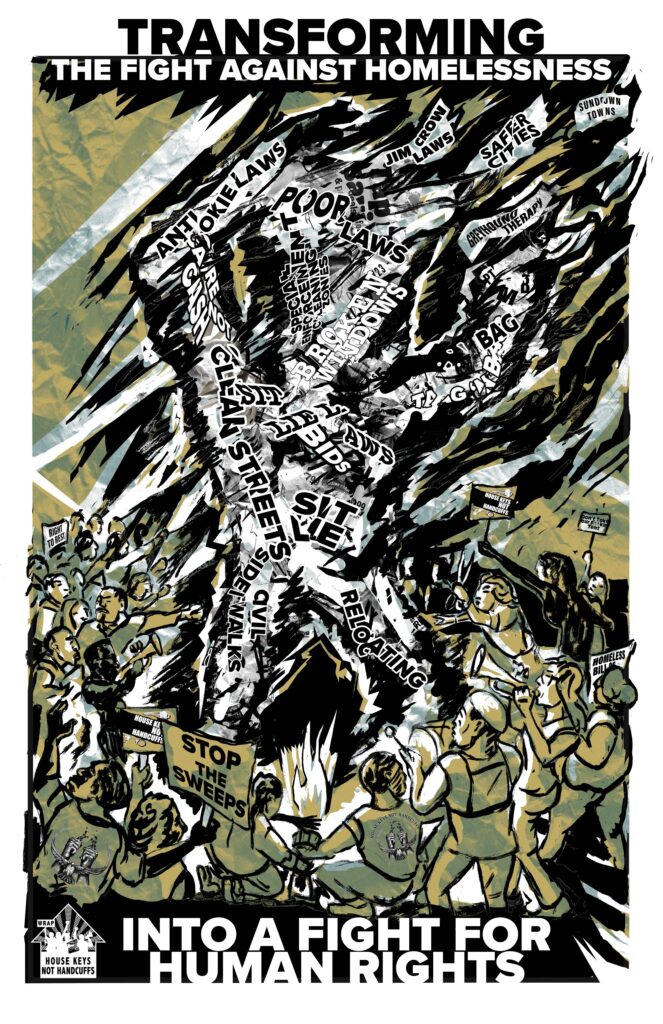
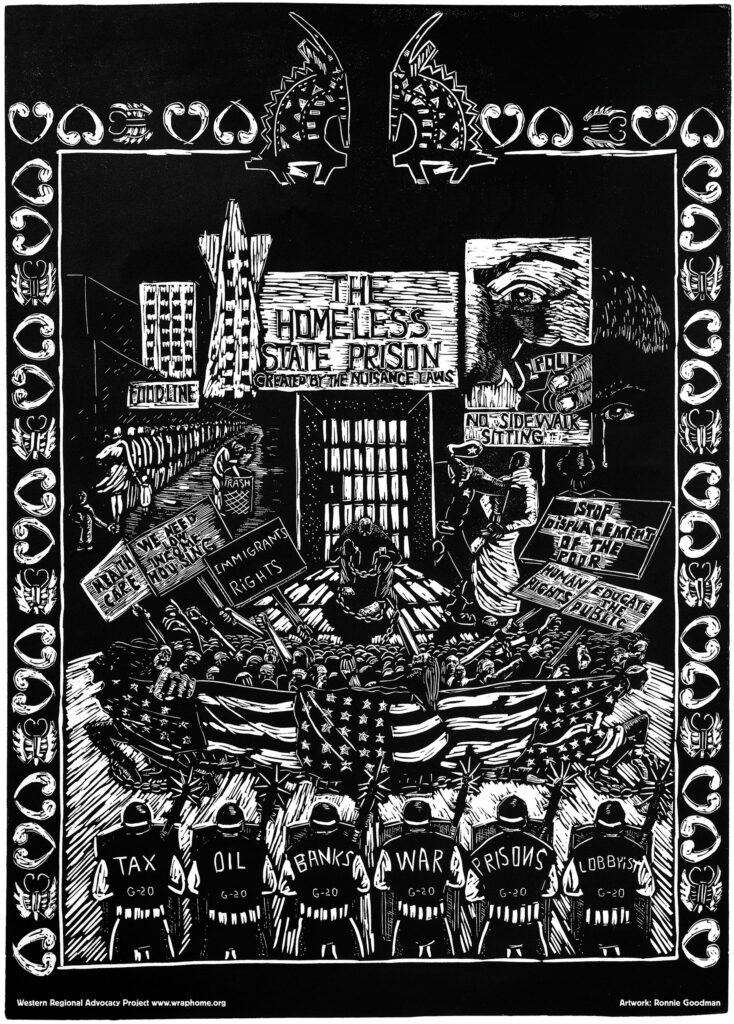


Leave a Reply
You must be logged in to post a comment.